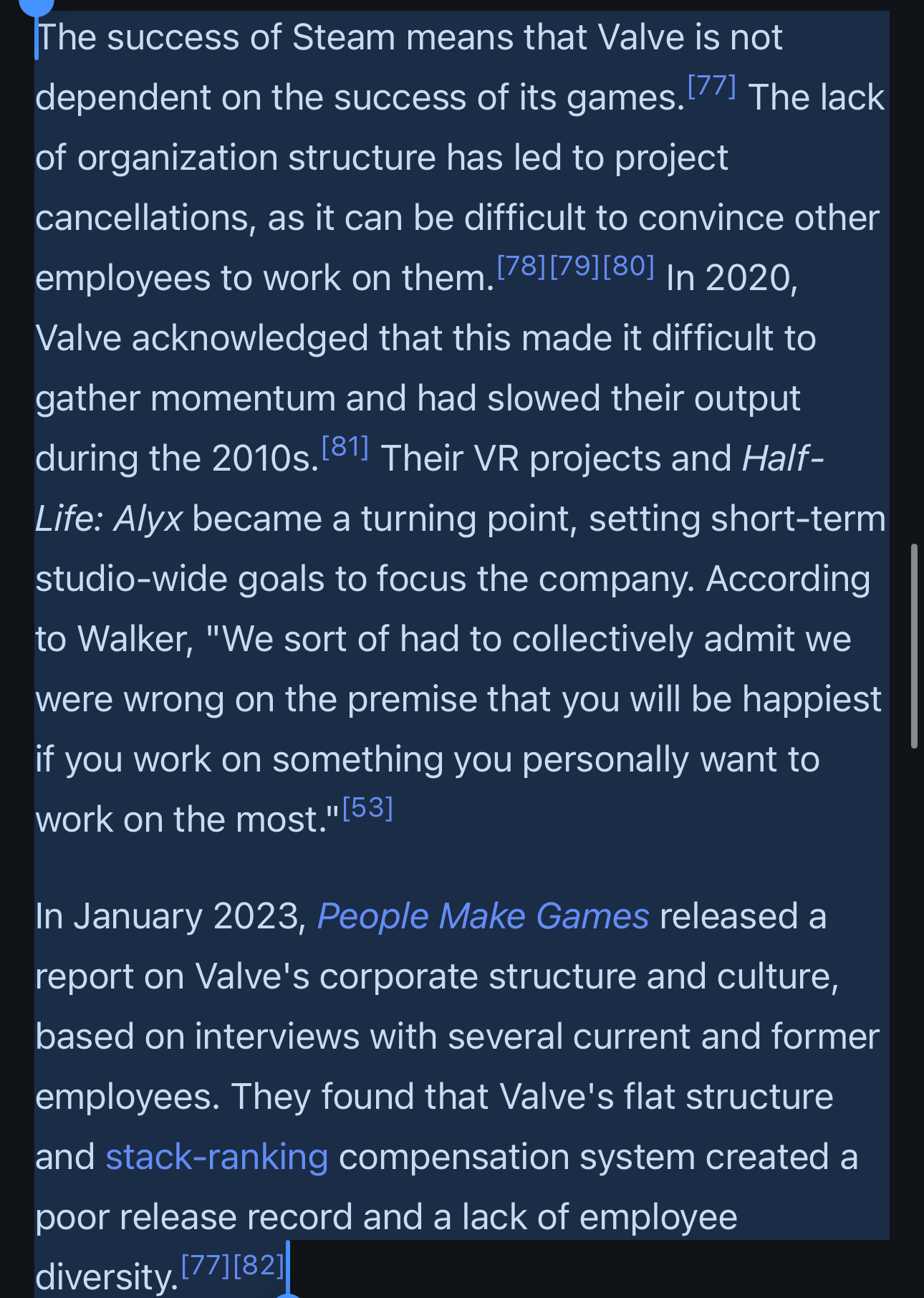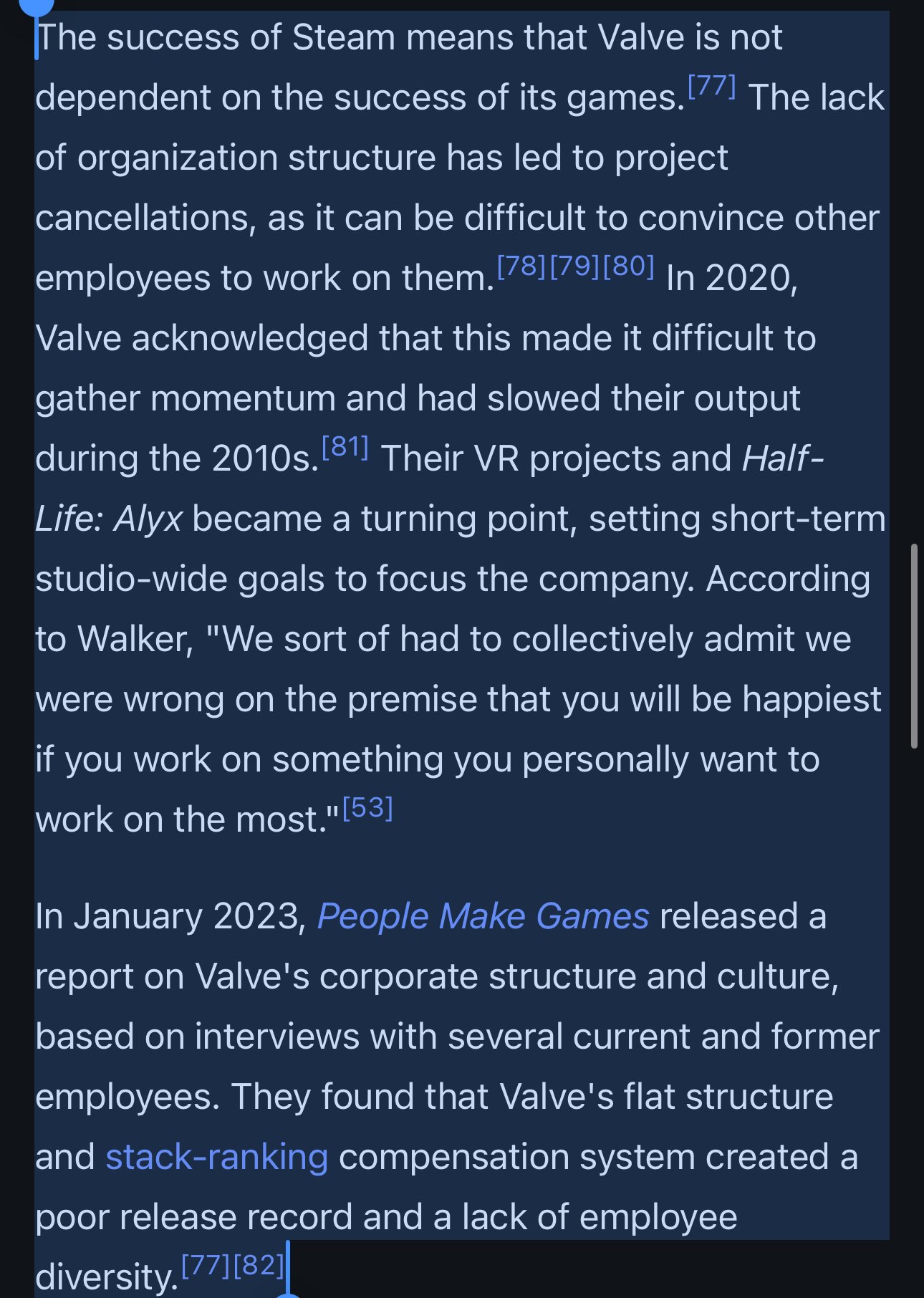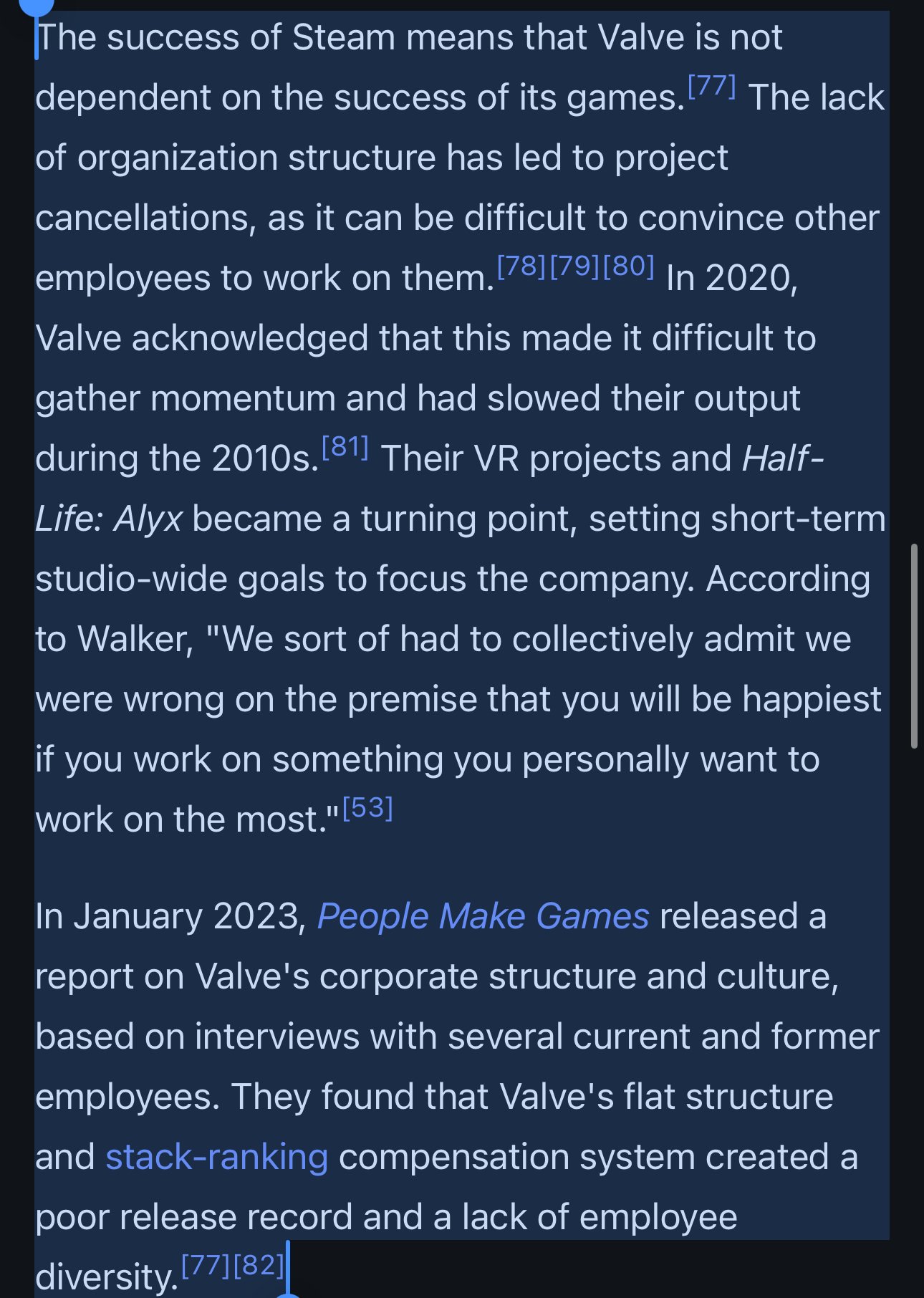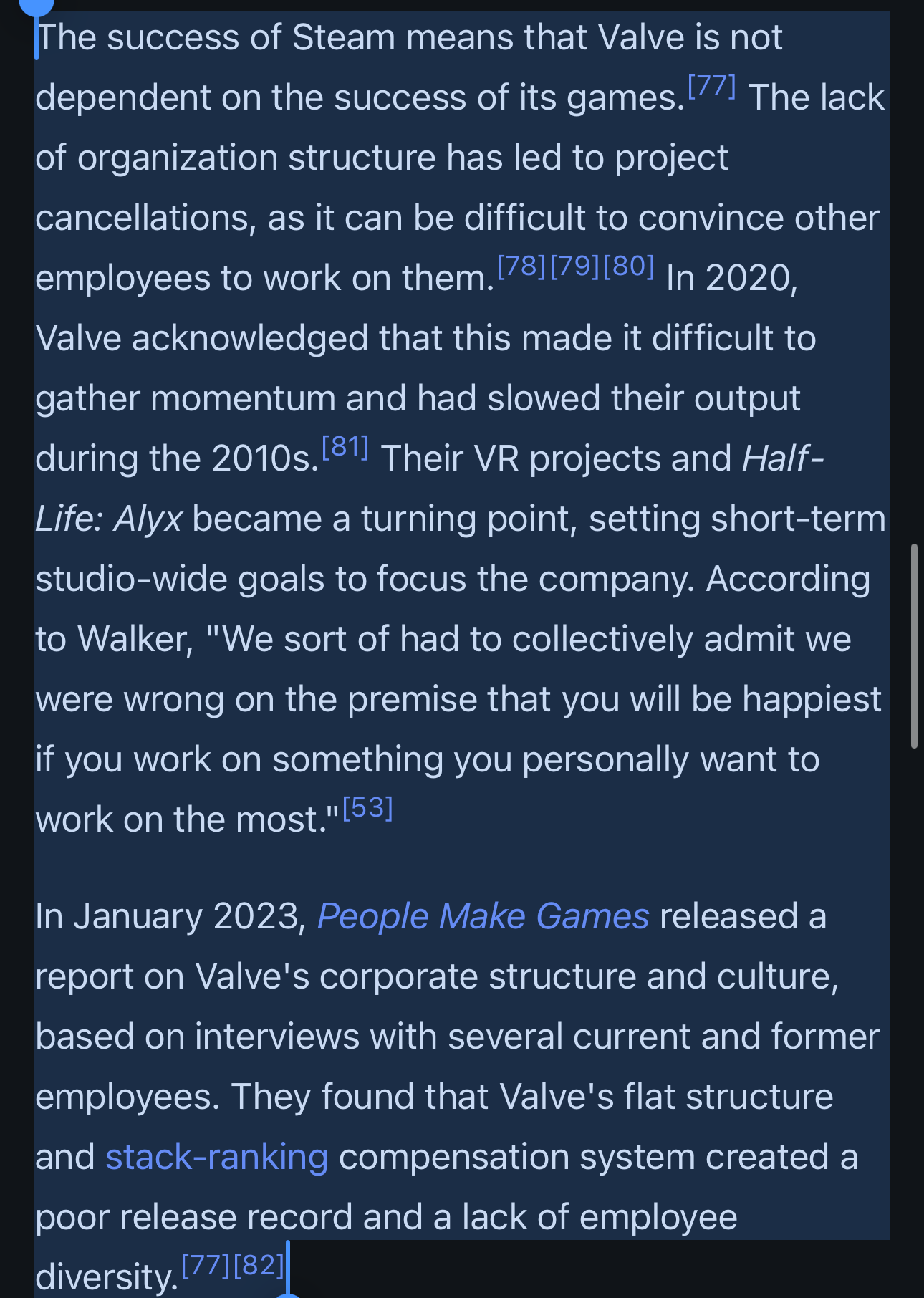How many times has this been posted now? Genuine question: why is this such a big deal?
Genuine question: why is this such a big deal?
These are not all video game companies, but for reference:
AMD: 26,000 employees
EA: 14,000
Facebook: 84,000
Netflix: 11,000
Spotify: 9,000
Twitter: 7,500Yep. But it also seems like people are so shocked by the data that maybe they’re missing the moral of this story, too? …sure it’s impressive that Valve has done so much with such a small workforce, but I think the reason they’ve been able to move so quickly is because they have such a small workforce. Companies get slow because they get big…I don’t care how much you tout your SAFe processes; you will always lose efficiency as you grow. It’s the difference between steering a canoe vs a cruise ship…the more you grow, the more you have to fight against momentum. So, my takeaway from this is that they figured out the secret to continued success as a maturing company, and good for them.
Now, I say all of this with sincere hopes that they don’t work their smaller number of employees to death and ask them to take on inappropriately burdensome workloads. Because if that’s the case, they should fuck right off with the rest of their peers.
From what I understand, they basically have a very open work structure. People are free to work on what they want, when they want. They actually are against high workloads and do everything they can to prevent employee burnout.
I can’t say if that extends beyond the development teams to other departments like server management, but everything I’ve ever seen about them says they’re all just in it to have fun, make cool shit now and then, and of course make tons of money. The fact that their sales platform basically just prints money helps support that culture, obviously.
It didn’t work out

That’s a bummer, but also not entirely surprising when you consider Half-Life 3…
Yeah it’s great to think letting your employees do what they want is good, which it is, but yeah everyone’s going to have their own idea and want to work on it. So who gets funding, etc.
It’s strange the person said they move fast, that’s not something I’ve ever heard in reference to steam/valve before, and so many upvotes? What’s going on here.
I think it speaks to developing for gaming over developing for infrastructure. What does it say about gaming where, a company that has a healthy attitude about work in general, has staff that prefer to work on addressing Steam bugs over working on a prestige game?
Do they? They have some pretty buggy and downright unplayable games due to griefers for years now so how is that even remotely true? And I’m sure their employees would rather build something new than to keep fixing old stuff, who wants that? That’s a pretty weird claim to say people prefer.
It’s like people bury their heads and ignore everything bad about steam/valve.
Steam/valve/newall seems to have this weird thing on lemmy, every other billionaire is cancer, but all hail GabeN, can’t have a discussion about anything here it seems without it getting derailed by people with rose glasses on.
And did you read anything posted? What’s “healty” about anything from my screen grab?
They have some pretty buggy and downright unplayable games due to griefers for years now so how is that even remotely true?
TF2 got bot-free recently. Let’s see how it lasts.
If the alternative is making a half life 3 that people don’t have the passion for then imo it’s working.
Or there’s not enough people with passion, since their passion is hats, or the higher ups have their preferred people they give funding too, part of the linked articles mention this stuff.
I don’t want forced passion. If an artists doesn’t want to create, they shouldn’t be forced.
So is game making an art form, I think so.
They never fully abandoned it tho
That is absolutely fascinating, kinda disappointing, and a really good find.
This is such a simple idea that people seem incapable of understanding
Big companies can’t innovate. They’re pulled in too many directions and create bureaucracies that stifle the individuality needed to push beyond known techniques. At best, they can iterate and imitate - and even that is very hit or miss
There’s this idea companies must grow or die - but in reality, companies grow until they can only perpetuate themselves. They start to only make sense on paper
Individuals drive progress - they need time and autonomy
your explanation brought to mind the design ideals behind the RISC (reduced instruction set computer) CPU architecture. Less complexity means higher throughput.
Hope its not a shitty simile lol
Your point about agility is valid but Valve hasn’t veered and pivoted their way to success. Their core model and service have stayed pretty consistent for many years now. And while a cruise ship can’t steer quickly, it can move a hell of a lot more people much faster than a canoe. They are just getting a lot done with very few people and it’s 100% worth of remark. I’d love to hear more about how they do it.
they take the whole company to hawaii most years iirc.
Valve has done so much ?
Steam hasn’t been improved since 2012.
They’re clearly coasting.
They’re keeping their keeping the 30% cut and running away with it instead of hire people to fix stuff.
Since 2012:
- Linux support - I joined around 2013 because of that
- Proton - massive Linux compatibility upgrade
- Steam Input - along with big picture mode and whatnot
- SteamVR
- hidden games
- cart improvements
- mobile app improvements, along with MFA
- collections
That’s just what I remember off the top of my head. I’m sure there’s more that I just don’t care about.
Remote Play Together is another big one for many, I’ve used it together with Retroarch, so much fun.
Oh yeah, and I didn’t mention Steam Family sharing or whatever it’s called now. And Steam Link.
Proton and Steam Input are biggest. And while Proton is built on shoulders of giants(wine), Steam Input is something that didn’t exist.
Hell i use steam for proton and linux. It really makes gaming so much easier than other services
So what. It works fine for me.
But it’s basically a store front and they contract almost everything out. Like how many people does it take to run some servers? They don’t make games, the steam deck and the VR are the few things they’ve done. And that could be done by a couple dozen engineers and contract everything else.
Like how many employees should they have?
Okay I shouldn’t have taken a shot at their game making ability, but it legit fucking sucks and they acknowledge it, people bash them for it sometimes, take it easy guys.

Twitter runs a single web application.
They also do make games.
Isn’t most of steam pages like the discussion, store page, forums, guides, workshop etc are self moderated by the publishers and developers?
And yeah they made Alyx in the last decade? They make hats for old games, that’s it it seems.
they have mobile games too, and a tech demo for the steam deck, and the known hero shooter in the works
basically the people who think valve doesnt make games didnt buy into any of their expansionary market projects (mobile/vr/steam deck). They make games, just ones you dont want to play/cant play
Nah, their corporate structure legit caused them issues making games, people like to think valve as this perfect company, but it’s hella flawed and it’s peak capitalism too.

Lemmy just seems to dislike anything remotely bad being said about them, it’s odd.
it’s peak capitalism too.
The screenshot sounds more like “peak anarchism” to me.
im not a steam stan for any reason (i rarely even buy shit off the steam store directly) but its disingenuous to say they dont make games. Id argue peak capitalism is when you force a sequel to a game that didnt necessarily need it. there are a LOT of things I can conplain about when pertaining to valve, but not making games isnt one of them. its a poor argument to make when users choose not to play what they dod make.
Its similar to Fallout and Elder Scrolls, its not that there ISNT a new fallout or elder scrolls game, its just they made ones that users mostly didnt want to play (ESO, FO:Shelter, FO:76, ES: Blades, ES: Castles) disregarding the also existing VR versions of each game.
the argument sounds very similar to thise currently complaining on the Nintendo front that Famicom Detective Club got a new game, and not other nintendo IPs like Star Fox (which had Zero, Guard and Starfox 2) in the last decade, and Fzero (which had Fzero 99). its never a matter of they didnt make games, its the matter that they didnt make games they wanted
Letting your employees work on what they like doesn’t seem like the worst thing. It might hurt game profits but seems much nicer for the workers.
I’m not sure what do you mean as moderation of store page.
They make the information on the store page, they moderate the forums, guides and workshop.
What does steam moderate themselves?
They make the information on the store page
At least some progress. How information on the store page steam would add without developer? How would steam know title of game, price and other stuff without developer telling it.
What does steam moderate themselves?
Reviews and refunds.
They don’t make games
DOTA and CS beg to differ. Spotify is a “storefront” that produces nothing but has about 25x more employees.
And valve contracts out or has the developers and publishers self moderate their own pages on Steam instead. Why is this shocking? Because a company contracts out instead of employing people and has their customers do stuff for free…?
How do you think Spotify works?
It would seem they pay more employees than contractors, that’s why their employee count is higher.
Removed by mod
How does a discussion have a loser? I was adding how valve has such a low employee account since it apparently wasn’t clear to anyone currently in the discussion.
Take offense that they legit have issues publishing any games due to their corporate structure…

But I was only adding to the discussion, why do you need to “win”? They have their customers moderate their store pages and they contract out employees instead. Can you provide polite discourse to this topic without being an ass or no?
You sure like posting that screenshot, don’t you?
Wall Street would probably say 15-30,000+. I think the point of the surprise is that actually it’s possible to be massively profitable and have good products without needing massive teams of people. How many mediocre/bad AAA games have teams larger than Valve’s entire staff? More isn’t always better, sometimes it’s just more.
I haven’t read this article, because yeah, I’ve seen this same basic headline over a dozen times in the past week on Lemmy, but I think it’s a testament to what can happen when a private company doesn’t have a lot of shareholders and is run by people who just want the company to run well and be profitable. They don’t have to chase some unsustainable Wall Street expectation of x% growth every quarter.
Most of the store front is moderated by the publishers and developers, and they contract out a lot of work, maybe what, one valve employee at a server bank with the rest being contract workers?
Most of the store front is moderated by the publishers and developers,
You say this a lot, but can you explain what this means?
?? The developers control the store pages, what needs to explained more? Go to the store, see what pages are linked there, those are the pages they are responsible to curate and moderate.
It’s an all automated system, you don’t think there’s a steam employee typing it all in or something do you? This have low staff numbers since it’s hella automated and contracted out.
All that says is that if you give people choice, they might chose not to make games in today’s market, that’s not bad imo. It’s possible that building new games isn’t what the world needs right now.
It says that every employee had their own idea of what valve should be working too. Nothing got done, games, updates, bug fixing, there wasn’t anyone to say hey, we need 5 guys to get this done. It’s nah I want to add hats to this game, but the griefers ruining this one isn’t important to me.
Its always interesting to see the rose coloured glasses spin on this own admitted failure.
It says that every employee had their own idea of what valve should be working too. Nothing got done,
I guess that’s where me and you would differ. Though they didn’t put out half life 3, imo valve has contributed more to my gaming experience than any other company and BY FAR.
So if this is things not getting done, I only want more of this.
Edit: I don’t understand the downvotes, so you guys disagree that valve has made my life better?
Like how many people does it take to run some servers?
That is exactly the point of post. You don’t need tenns of thousands of people to run some servers.
You do need employees and valve contracts them instead of hiring directly.
This is the detail people are missing or ignoring in their circle jerk of valve here.
Then I will repeat YOUR question:
Like how many people does it take to run some servers?
??
Hint: none of those companies need all of those employees.
These stats don’t include subcontractors and as such they’re very misleading. For example, who do you think produces the GPUs inside the steam deck? Hint: it’s not Valve.
Why would Valve produce their own GPU’s?
My point being that while valve itself has only 350 employees, it subcontracts far more than that.
Do we include the plumber that unclogs the toilets too?
Yes.
that’s really silly to argument. only a few manufactures in the world even have the capabilities to produce GPUs and CPUs. even China doesn’t have the fabrication capabilities with current generation. So of course, Valve is going to purchase GPUs from a 3rd party unless you expect them to spend tens of billions of dollars to start their own silicon fabrication…but oh wait, now they have to purchase silicon, so they’ll start their own silicon mine… but now they need trucks…so they start their own truck manufacture…
Do you expect them to become Samsung?
deleted by creator
A better argument is who works on Proton compatibility? It’s largely not Valve employees, yet that’s a unique stack to Valve.
It annoys me too that Valve is getting most of the credit for Proton while most of the work is actually done in winehq, dxvk… I’m sure Valve pays for some development here and there, and greases some developer wheels, but the main thing they do is being a front end for consumers.
I think you’re discounting just how much they’ve invested and continue to invest in Proton/WINE. But they don’t do lion’s share of the development in-house, they mostly just pay devs to work on it, and yes, manage the FE in Steam. They’re still a massive positive force for change in Windows game compatibility on Linux, and we’d be nowhere near where we are today without their investment.
I think you’re discounting just how much they’ve invested and continue to invest in Proton/WINE
I’m not really sure I am… Do we have some actual numbers into how much money they’ve sunk in linux?
Gaming on linux is a huge community effort, whether it’s wine, dxvk, vkd3d, mesa, linux itself… and plenty of smaller projects like lutris, bottles, UMU… And all this spans literal decades, far before valve ever got involved.
None of these companies are comparable other than they’re also tech…
IDK, Spotify is somewhat comparable… they both distribute digital media.
EA is not video game company?
Yeah, netflix is though
Slow Newsweek for gaming, I guess. They have had a public employee directory on their website for as long as I can remember; it’s not really news.
Been seeing a lot of anti-valve corporate propaganda lately I think they’re upset with the way they run their company because it shows that in comparison their own companies are being greedy and hoarding wealth. It also shows how vastly inefficient in comparison they are.
Weird take, in valve more money is saved for Gabe himself (hence his half a dozen yachts….), while on the other hand, the companies with more employees spend more on giving other people money.
So who’s hoarding using your logic? The company with 10 bil in revenue and 200 employees, or the company with the same revenue and 20000 employees…? Because to me it seems ones doing more for citizens at large than the other lining one persons pocket far More.
The company with more wageslaves of course. I’m sure valve employees are paid very well. Yeah Gabe Newell is a billionaire and I’m not defending that, he should definitely be paying more in taxes. As they all should. But the way valve runs things is their business as a private corporation and I’m tired of seeing the being tore down for no apparent reason lately. Lots of better targets. It seems motivated by something larger behind he curtain and I don’t like being manipulated.
It’s being tore down because they do nothing with their wealth but buy newall yachts….
Valve is an excellent example of a sustainable tech company. It’s not on the growth at any cost, boom and bust cycle
I recall in a decades old Texas Univ interview, Gabe said you had to be aggressive in your firing processes.
Is the same video I recall they made him put on a horse head and try to hold up three fingers.
They just provide a service good enough for the more toxic gamers so they won’t get harassed, nothing more beyond that. They have almost nonexistent moderation, and no longer are developing games.
They are developing a game at the moment, Deadlock. Lots of footage and a dev build leaked a few months ago.
Steam is successful because they’re the only company in that market treating customers right.
I’d be very upset if the courts side with EA.
and because they are not publicly traded company.
Well that’s why they actually do right by their customers. That said I definitely agree
They’re also one of the few (possibly only) that has not gone public.
Just a coincidence, I’m sure.
There are plenty of private companies that are shitty too. It definitely helps being private (and maybe is a requirement?), but you also have to have the right owners for private companies to be good.
For sure… Just one more reason to adopt co-determination laws like those in Germany.
Public or private, if the board of the company actually contained literal workers, it could make things so much better.
Wait what’s going on in the courts between valve and EA?
What are EA doing with Valve? The lawsuit this came from is between Wolfire Games and Valve; far as I can tell, Valve and EA work together on some stuff.
Steam could use better search. Ideally I’d like to be able to just use SQL, but I understand why not.
There’s been a few times where I wanted to find something in Steam, but spent most of the emotion on clicks and fucks before launching something, concluding that yeah, I wanted this, and stopping it because I don’t want this anymore.
Steam DB has a pretty decent search. It’s not SQL but the filters are a bit better.
I know how you feel tho - so few consumer orgs give us an advanced search worth it’s salt. I want to have (x AND y) OR z, or maybe x AND (y OR z)… Not whichever specific combination was preordained for me.
I know it’s not as horrible as some.
If only this were still a thing in search engines.
I still can’t figure out how their search filters work.
It always blocks games with violence whether I have all filters checked or unchecked
I think people often hate steam for their success, but fail to see it’s the result of customers’choice in a free market. (I see it enough I’m not sure if people get paid to hate on them… To ruin the thing they have most of customer respect)
Steam is not publicly traded and does not act like every other publicly traded company. It invests in its customers experience and custtomer come back for that. It does not nickel in dime or use its position to hold its customer captive and enshitfify its product. It’s not an ISP…
It invests in hardware and software development it believes the industry needs not to make a massive profit but to be a champion of what gaming should be (Linux, steam link, index, bug picture, steam controller, steam deck) These products are experimental and usually sold at or near cost not to make money but to prove to the market there is a need and a demand.
They are often a champion and voice of the gamer.
They could have tried to be like Bethesda and tried to monetize their workshop but they didn’t.
Sometimes they’re quiet and we don’t hear anything about what they’re working on, but that doesn’t mean they aren’t working on things.
I can’t imagine pc gaming would have survived and resurged without steam. And I hate to think what it would be like if there were just 5 epics, origin, Uplay, whatever other launcher. I think gaming would look like mobile games…,… which takes a 30% cut too and can only sell in apple or android markets… No one bitches there and they offer no services.
I agree with you, but justifying anything by saying they’re successful in a free market is really iffy. There are plenty of large evil companies that are incredibly successful. That said I agree with everything else you’ve said.
I personally think 30% cut is too much for any app/software store. But if anyone deserves it Steam does
My reference to free market is only a means of saying customers choose steam because of its offerings not that they have too.
I agree it would be nice if they charged less. However do we know their full PNL/balance sheet? People just keep taking revenue/employees as if employees are the only overhead.
They provide the servers, and do have an rde cost for development for services we discussed like cloud saves, control support etc. if people have this much energy over it attack pharmaceutical for there insane mark ups that would drive way more positive social change. But the people driving are mostly trying to make more money by cutting there publishing expenses through steam. I’m sure psn and Xbox also take 25 to 30percent cuts.
They also championed low publishing costs of only 100 dollars to list a game. I don’t know enough to speak to their update charges though. Hell psn been known to charge 25k for visibility in top of their 30% cut and there are no other market options Reference
Everyone focuses here cause developers and publishers want more of this cut and to me seem to try to push steam into regulator cross hairs as a way to force the changes they have failed to negotiate.
I would also point out brick and mortar sellers also take 15 to 20% cut and then also charge for storage, disposal, fulfillment, return on and on. Amazon does the same. It’s the nature of a market place. Reference
Overall it doesn’t make sense to me as a community that we attack our best example of what a game market place should be.
No harm meant. I do think Steam is the golden example of a big business done right. All I’m saying is that there’s room for improvement.
However do we know their full PNL/balance sheet?
We can make an educated guess. Amazon’s S3 charges roughly $0.025 per GB, so an 100GB game would cost $2.50 for Steam to upload to a user. For a $30 game, that’s around ~8.5% or just over 3 downloads before it’s unprofitable.
Obviously Valve isn’t paying consumer level S3 prices, and obviously users can download multiple times. But I would be extremely surprised if they didn’t make a rather large margin on each sale
Total fair always room for improvement, no ones perfect.
Appreciate the good discussion!
Assuming there will never be any updates, 3 downloads is what regular gamer can do. First computer, second(friend’s) computer and reinstallation on first computer.
$0.025 per GB is the most expensive option on S3 I could find rounded up. It would be absolutely insane if Steam were paying those prices when they have their own servers. I also used 100GB game size as a large number, and $30 as a small price tag (for an 100GB game).
I was trying to be charitable with the numbers and it still came out pretty positive
$0.025 per GB is the most expensive option on S3 I could find rounded up.
What is cheapest and at what speed?
I also used 100GB game size as a large number, and $30 as a small price tag (for an 100GB game).
I get it, but then there are all those heavy f2p games like War Thunder, from which Steam doesn’t get anything.
You can look it up yourself, I was just giving a worst case scenario
Amazon’s S3 charges roughly $0.025 per GB
For storage or for download?
Download. It’s also rounded up. Storage is negligible compared to bandwidth, especially considering Steam’s business model
And their cost is going down over time while their revenues are increasing since they take a % off every sales and sales are increasing and so is the average price of games.
They make enough profit for the boss to be a billionaire, enough said.
justifying anything by saying they’re successful in a free market is really iffy
The important part is why they’re successful; unlike many companies which try to lock customers in and take advantage of them as much as possible, Steam/Valve try to build a good product at a reasonable price, and trust that it’ll bring them customers.
And look at that, it does.
In human societies culture matters. People who become managers often have intrigue and taking advantage of people as their main useful skills. So they just go on doing what they know. No reason to scold them even, this is life. After all, something should serve as the backdrop for companies doing it right.
Valve started differently.
But you surely already know all that, Revan. How’s Bastila doin?
These products are experimental and usually sold at or near cost not to make money but to prove to the market there is a need and a demand.
Well, no… I think it’s more akin to the concept of “loss-leaders”. Get people in the door and while they’re there, they’ll buy a game or two. Which is where their real profits come from.
In the end, it’s still just a business strategy intended to result in profits for Valve.
However, that being said, the fact that they don’t have a fiduciary responsibility to shareholders to maximize profits and keep that stock price up at (literally) all costs, allows them to operate the way they do.
But don’t get it twisted, they are a for-profit corporation, and their ultimate goal is making money. They’re just not as shitty about it.
The bar is REALLY fucking low these days.
Oh for sure they are there for a profit. But as the best example in the industry let’s not unnecessarily attack them. Imagine how much more money they make if they did go public and how awful it would be for all of us.
Totally. I wasn’t trying to rag on Valve… More just a comment about capitalism in general and how shitty it is.
They kind of have to be about making money. No company survives by putting the needs of the customer above all else, unfortunately.
I think people often hate steam for their success
I hate them for forcing me to use a kind of DRM which will stop working once their servers stop.
Halflife was just fine without steam. Adding steam seemed to be a way to stop players from sharing CD keys.
Luckily steamless is piss easy to use because Steams “DRM” is only meant to be preventative. As in, you’re playing it on steam for the community, workshop, cloud saves, per game notes, control scheme setups, etc etc.
That’s kind of why they are successful though, right? They were the ones that figured out how to supply games digitally for a profit, which required a way to prevent people from sharing the product for free. This was previously done with CD keys, but the advent of the internet rendered that mostly ineffective.
I think publishers value the fact that steam is essentially a form of DRM, so we got fairly lucky all things considered. Imagine if steam didn’t exist and we had to deal with software like Uplay and Origin.
Imagine if securom was everywhere again.
The way I see it, Steam having DRM is Valve’s way of giving publishers and devs that choice, and said choice just makes Steam more likely to stick around for the future, which makes the biggest drawback of DRM (losing all your games) less likely.
You can play: Half-Life 1: Source Half-Life 2 Half-Life 2: Episode One Half-Life 2: Episode Two All with steam closed. Original half life expansions aside, your take is senile. I suppose alyx could’ve done without it.
Okay, but what about all the games that have come out since steam has launched and ONLY have online-only drm options?
Not talking about MMOs because those are their own beast. I’m talking about a huge amount of games though excluding mmos.
I don’t mind
digital distributionDRM platforms, I just want a choice. I want licenses to be portable and I want to be able to re-sell licenses for games I do not wish to own any longer. I don’t want to be bound to just console games either.I don’t think resellable licenses are a great idea. It works with physical media because it will have flaws that affect quality and price, but I don’t see how that would work for digital without screwing over devs. I can completely get behind transfers or trades with friends or between platforms, but not really for resale.
I can get the transfers between friends part, but why between platforms? That makes zero sense from a business standpoint.
The only way that would work is to have game companies manufacture and distribute an external storage medium themselves, because platforms sure as hell won’t say “Oh you bought a license on another store? Sure, you can use our CDN for free!”. And now we’ve almost reinvented game CDs.
I would gladly pay a couple bucks a month to use a digital distribution platform of my choice.
I agree in that it’ll be hard to transfer between platforms, but doubt it’s impossible. The idea is that you don’t want Valve to nuke your licenses in one go, but Valve also doesn’t want you on their platform.
Okay, but what about pre-steam DRM? But what about services that have existed for less time and actually done the slippery slope shit you’re cowering in your boots about (Uplay)? You’re so busy listing possible problems and making problems up that you are not comparing and contrasting your available options. It strikes me that you are complaining to complain and don’t have realistic solutions in mind, you’re asking for either a rental system where you put up collateral to play a game or you’re suggesting that the developer only be able to sell a game once. Are you one of those crazy “first sale doctrine” sovcit types?
deleted by creator
And the fact that they can just decide to take your games away from you by deleting your account?
Steam was apparently already cool when I was a kid. Though the reason I knew about it was that I had 2 games with Steam support bought in stores (one of them I gifted without installing\registering, another one I installed without registering).
Others are still at that point - you buy a game and you get something like GameSpy and such as an optional thing nobody thinks about. They are trying to make those services the entry point, and I guess for AAA players they have already succeeded.
It’s not an ISP…
Valve has AS number, so it is an ISP
Having an AS does not make you an ISP. It just means you have a public AS, which you can use to peer with providers on the Internet, if you have an agreement to peer.
Correct. In fact many, many companies have ASNs. Little companies all the way up to large ones. The key difference for an ISP is they allow you to route traffic through them. Almost every company that has an ASN blocks traffic from being routed through them, assuming they know how to configure that and that they have different peering points. Valve most certainly does not allow you to route through their network, they already have enough traffic just doing their own CDN stuff.
Quick! Let’s add about 800 useless Managers!
Who each will need a couple of consultants from McKinsey, PWC, you name it, to do their jobs!
What’s Mckinsey, a type of cheese? PWC? Is that a firearms company?
Ok… let’s walk through that together! This is my comment if your guesses were correct:
“Who each will need a couple of consultants from a type of cheese, a firearms company, you name it, to do their jobs!”
See how that a) doesn’t make any sense b) is not funny and c) is grammatically dubious at least?
You could probably do better punch-up if you tried, right?
700 should suffice for the first level, but then, you need more than one level.
This number doesn’t seem to include support staff who iirc are contract workers so might not count as “employees”.
Most of the support staff is their customers and users actually.
Most of the store is curated and moderated by the developers and publishers, but you’re not wrong about stuff like server farms and development.
But I’m also curious, there’s a line, so where is it? No business is going to include the plumber and electrician they hire to do occasional or even routine work and maintenance. So do the same techs working on server equipment count or not? Where’s the line on this who’s a contracted employee instead of contracter.
Most of the support staff is their customers and users actually.
It’s not users that process refund request, recover your account if e.g. you’ve lost your 2FA method, or any of the other innumerable things you might need to contact Steam support for. I don’t think it’s unreasonable to include the staff that do this as part of their workforce.
Work smart not hard.
Economists are praising it‘s efficiency but there are massive shortcomings when it comes to costumer support. A couple years ago I was told they have a whopping single person dedicated to matters in the german market for example. Anyone who has any idea about the german bureaucracy hellscape knows this is far from sufficient to deal with any issue whatsoever. And I suspect it‘s not running much smoother elsewhere.
costumer
I don’t think valve owes the cosplay community squat.
in a serious reply to your point though:
I appreciate their line of thought - why dedicate resources for roles that don’t add value to steam’s development just to engage with every country’s unique bureaucracy? until those countries fine valve for noncompliance it seems like an easy choice to make.
Anyone who has any idea about the german bureaucracy hellscape knows this is far from sufficient to deal with any issue whatsoever.
Maybe that’s contractable.
Does that matter when the bottleneck is this tiny? A single employee would have to contract, stay in contact and approve whatever they outsource. And going by some quirks with the german side of the store their usual response seems to be simply blocking german IPs from accessing whatever may cause extra bureaucratic work for them.
The single full time employee is the lead or manager. They have some number of contractors to work with but aren’t headcount.
Specifically that person probably contracts a law firm to handle the bureaucratic aspect, on an ongoing basis and a support team to handle low level issues.
It’s interesting because I’ve never had to wait for too long for a reply. So I assume they have a lot of automatic tools helping them out in some way.
It has been years since I’ve contacted Steam customer support so maybe things have changed, or maybe my experience was not representative, but I found them to be pretty helpful and not-shit when I contacted customer support for something in the past.
Sounds like they’re using computers effectively. Not sure why this is news.
THB, they could use a few more employees and it shows. Community moderation is awful and there are many nazi groups. The whole trading ecosystem is ripe with frauds and many games released are cheap shovelware, asset flips or broken. And don’t get me started on the problems with abandoned Early Access games. Valve could hire a few more people and maybe try to tackle those issues.
The shitty games released on steam are the outcome of it being relatively easy to publish a game on the steam, and that should absolutely not change. Let people publish their crap that nobody will play, you don’t see the vast majority of it.
No ones forcing me to use them. No issues here.
Yeah same. I don’t play a ton, mostly on the deck,. And I also avoid interaction with other people on their platform. But I’ve never had an issue.
Not sure what valve can do about abandoned early Access games other than remove them if they’re not updated in a certain amount of time. Although that causes problems too.
Not really clear how having more people would fix these issues
They could create a new flag for Abandoned Early Access games. If an Early Access game hasn’t been updated in a long time, that could trigger an automatic email to the publisher saying “Hey your game hasn’t been updated in a long time and could be changed from Early Access to Abandoned Early Access. Consider updating the game or store page to keep Early Access status. If you would like to switch to Abandoned Early Access, you can ignore this message and it will automatically update in two weeks or you can manually change the status on your game’s Steam page.” Wouldn’t really need more employees to handle this unless the current employees are all too busy to implement something like it.
They could easily prevent devs that abandoned an early access title from launching another one. They could check if the devs have a reasonable business plan and are able to fulfill their promises. They could vet them and check if they did manage to release some games. And so on. It is not impossible and would help us gamers, because nobody wants abandoned games.
This take will probably be unpopular, but FWIW I agree with you. I rarely use the community feature and I don’t care about the trading so personally I would like it if they just stuck with what they do well.
I assume Valve, like the vast majority of tech companies, outsources moderation. It’s normally outsourced to incredibly underpaid and overworked people in the global south not given proper training for these things.
Is this why they suck with CS2?
laughs, then immediately weeps in tf2
Watch the heavy update will drop any second now!
Annnyyyy second now…
Just took a look at the future and im sorry to say the heavy update wont happen tho we got half life 2 episode 3
That’s less than the number of employees who worked on Left4Dead 2.
the manager:

I just read that it’s 80 people, which one is true now? https://lemmy.dbzer0.com/post/24263263
Valve vs Steam
FIGHT!
What other things does Valve work on?
We may joke about valve not making games, but they do have a large amount of people working on various titles.
They also do a lot of R&D for hardware, like the Steam Deck and VR headsets.
Gabe owns so many yachts.
At some point that 30% cut and not spending it on anything, you have to buy something

































